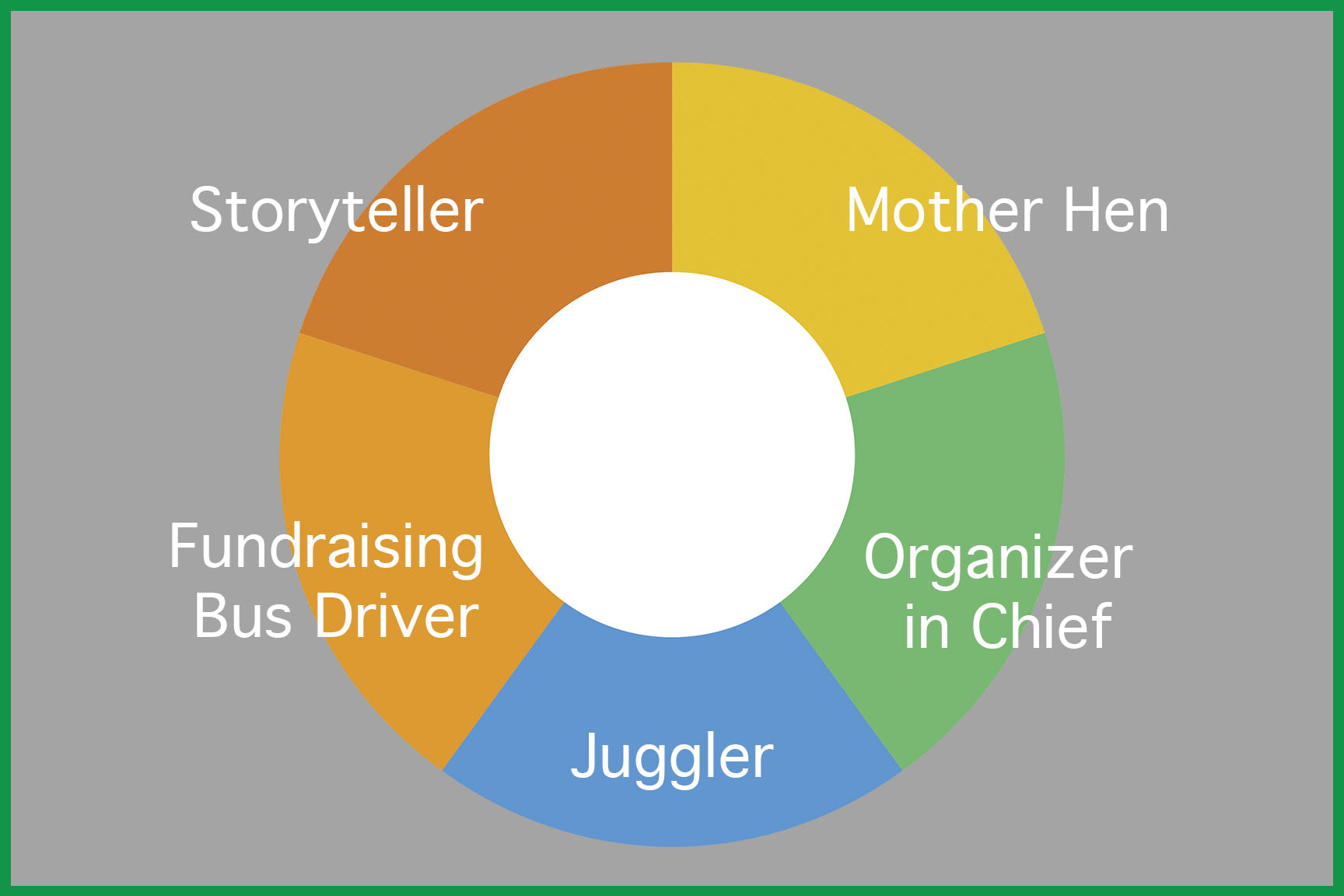by Betsy Steward
Years ago, as Director of Development for a small nonprofit, I was always taken aback when, after a big gift came in, my organization’s board chair would cheerfully announce to the board that “Betsy’s magic” had done it again. Although I know she genuinely meant it as a compliment, I always wanted to yell, “Magic? MAGIC? There’s nothing magic about it! It’s know-how, organization and elbow grease, and did I mention know-how, organization and elbow grease???!!!”
Indeed, neither I nor any other development professional has any magical powers. But the myth persists. So, I thought it might be helpful to my readers to share exactly what a development officer does, and why it’s smart to hire one.
Juggler
If I had to describe the development staffer’s activity in one word, it would be juggling. There are really only six ways to raise money, and all six methods should be active, no matter how big or small the nonprofit. Each method involves multiple activities that must also be juggled. That means that the development office has a lot of balls in the air at every moment.
All methods of soliciting charitable donations fall into one of these six categories, each of which must be managed and maintained:
- Direct Appeals (end-of-year appeal letter, newsletters)
- Events (galas, golf outings, virtual or in-person house parties)
- Grants (from Corporations, Private Foundations, Government)
- Online Fundraising (website, Giving Tuesday, email blasts)
- Major Gift Solicitations (personally asking for 5-6-7-figure gifts)
- Bequests (aka Planned Giving – asking a donor to put the nonprofit in their estate plans)
Storyteller
The first thing a development officer must do is learn about the nonprofit: why it’s needed, who it serves, its history and its impact. Deeply understanding the problem being addressed and the solution the organization provides affects everything, from appeal letters to grant writing to major gift solicitations and more. A development officer must be able to describe your mission and your methods compellingly, compassionately, and concisely, in person and in writing. Even for a mission that seems straightforward—curing cancer, for example—a development officer needs to do a deep dive on the organization’s specific story, so she can answer a donor whose question—sometimes stated but most often implicit—is, “why should I support you and not some other organization [trying to cure cancer]?”.
Organizer in Chief
If all the income streams are going to work effectively, it means planning, strategizing, adjusting plans and being disciplined about keeping all the details in order. Lack of organization means you’ll fall down on the follow-up—which is the kiss of death for some of the best laid plans. Consider these:
- You say you’ve written a compelling grant proposal? Oops, looks like the deadline was last week.
- Your end-of-year appeal brought in a lot this year, good for you! What? No time to write thank-you notes?! There go your chances for repeat or increased gifts from those donors next year.
- Your annual fundraising gala is in two months, and you don’t have any sponsors yet? Uh-oh. Too bad you didn’t follow the best practice of beginning work on an annual event the very next day after the last one.
Fundraising Bus Driver
Some of my clients have utterly fantastic boards, who enthusiastically participate in fundraising. But without a bus driver, the fundraising bus can go off the road and over the cliff. An effective development officer will guide board members who are excited to cultivate or solicit—making sure they don’t conflict or overlap with each other, or with strategies already determined by the staff.
Other nonprofits have boards that are just learning about their role in fundraising. In that case, it’s the job of the development officer to educate and inspire board members about fundraising—how it works, their role in it, and how rewarding it can be.
Mother Hen
We know in fundraising that people give to people they trust. A development officer’s job is to build that trust and strengthen the relationship with each donor. A fundraiser must listen and learn to find out a donor’s interests and passions, keep track of that information, and then figure out and execute a strategy for growing each individual donor relationship. Like a mother hen watching her chicks, a good development professional is always aware of her donors—each one’s reasons for being involved, what motivates them to give, and what could engage and inspire them to continue and increase their gifts.
Why You’ll Be Glad You Hired a Development Professional
If you’ve read this far, I hope you’ve gotten the message that magic has nothing to do with professional fundraising. Rather, it’s a combination of intense attention to detail and strategic, big-picture thinking. Without someone focused on it and nothing else, it’s hard to imagine the funds you need coming in.
I often think of fundraising like a tennis match: a donor expresses interest, the fundraiser responds, the donor expresses more interest, and the game goes on. It may start with a simple online donation or an introduction—but if there’s no one in your organization to return the volley, how can your nonprofit possibly win the game?
Successful fundraising requires time, focus, knowledge, energy and compassion. Hiring a professional to give fundraising the attention it needs and deserves is a no-brainer. If you don’t, how can your nonprofit possibly thrive? And remember, if your organization isn’t thriving, the people you serve won’t get what THEY need. Do it for THEM.
Betsy Steward is Senior Consultant at the Heller Fundraising Group. She advises clients on capital campaigns as well as major donor cultivation, solicitation and stewardship. betsy@hellerfundraisinggroup.com

